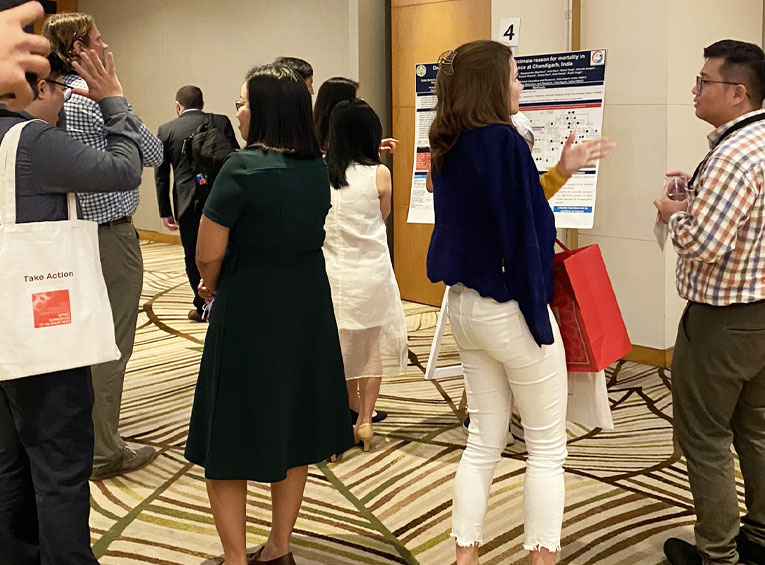This article is taken from an extensive feature on the 2023 HAEi Regional Conference APAC, published in Global Perspectives #1 2023
A summary of the posters available during the session:
Drug Allergy Mislabelling In Hereditary Angioedema Patients: Prevalence And Impact – by Jane Chi Yan Wong et al., Division of Rheumatology and Clinical Immunology, The University of Hong Kong
The researchers reviewed the medical records of all HAE patients in Hong Kong to conclude that drug allergy is a common misdiagnosis among HAE patients, leading to negative clinical outcomes and delayed HAE diagnosis. Dr. Noel Wang, who presented the poster during the session, suggested that the research should lead immunologists/allergists to review all suspicious drug allergy diagnoses, especially among HAE patients.
Delay In Diagnosis Is The Commonest Proximate Reason for Mortality in Hereditary Angioedema: Our Experience At Chandigarh, India – by Prabal Barman et al., Pediatric Allergy Immunology Unit and Venerology and Leprology, Post Graduate Institute of Medical Education and Research, Chandigarh, India
The authors examined the causes of death in patients with HAE in India. Their research was conducted amongst Indian families who reported the death of at least one family member due to laryngeal edema, but only 13 out of 65 families had a diagnosis of HAE. The authors suggest that delay in diagnosis may be a common reason for death and that awareness and appropriate emergency care need to be prioritized.
Start And Success Of Long-Term Prophylaxis In Hereditary Angioedema In Hong Kong – by Jane Chi Yan Wong et al., Division of Rheumatology and Clinical Immunology, The University of Hong Kong
This paper focused on the use and efficacy of long-term prophylaxis in Asia. The authors, represented by Jane Chi Yan Wong during the poster session, trialed LTP in a group of adult patients with HAE and found that the number and duration of attacks significantly reduced following treatment, and the quality of life scores significantly improved. Jane C.Y. Yong concluded that long-term prophylaxis is a safe and efficacious preventative treatment option and encouraged the introduction of long-term prophylaxis into Asia.
Triggers and Prodromes Identified in Patients with Hereditary Angioedema in a Single Centre Cohort from North India – by Suprit Basu et al., Postgraduate Institute of Medical Education and Research, Chandigarh, India
This paper considers the unpredictability of HAE and the existence of triggers and prodromes (early symptoms indicating the onset of illness). The authors report on evidence from clinical records of 180 people with HAE in a single center in India. They identified that 37.2% of people reported prodromal symptoms, with these symptoms occurring more commonly in women. Just over half (57.8%) of people reported triggers for their attacks; most commonly, this was trauma (65%). Where possible, the authors suggest that the avoidance of known triggers may be useful, especially in resource-constrained settings due to the lack of access to HAE treatments and care.
Profile of Hereditary Angioedema From Nepal – A Speck of Imprint On Everest – by Dharmagat Bhattarai et al., Advanced Centre for Immunology and Rheumatology, Kathmandu, Nepal
The authors investigated how HAE is diagnosed and managed in Nepal. By reviewing recurrent angioedema patient records, five people with HAE were identified. The authors conclude that this is the first Nepalese cohort of proven HAE cases. Speaking to the poster at the session, Dr. Bhattarai suggested that a lack of awareness and diagnostic facilities had hampered diagnosis, leading to inappropriate treatment and poor outcomes for people with HAE in resource-limited settings like Nepal.
Find more feature articles from the 2023 HAEi Regional Conference APAC:











